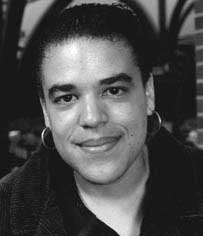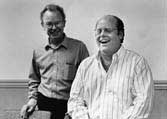![]()
ALUMNI MAGAZINE
AUGUST 1999
| FEATURES | ||
| LETTERS | ||
| AROUND TAPPAN SQUARE | ||
| A STUDENT PERSPECTIVE | ||
| HISTORIAN'S NOTEBOOK | ||
| ALUMNI NEWS | ||
| THE BEAR NECESSITIES | ||
| ONE MORE THING | ||
| STAFF BOX |

(Alumni News, continued)
 Music
scholar Charles McGuire '91, a visiting assistant professor
of music at Ball State University, is exploring the link between
the sight-singing method known as Tonic Sol-fa, and 19th-century
evangelical Christian reform movements that focus on the methods
of evangelization and principles of self-improvement. A double-
degree Oberlin graduate with majors in musicology and history
and a minor in trombone performance, McGuire presented a lecture,
"Tonic Sol-fa, 'Moral Reform' and Elgar's Oratorios" in April.
Music
scholar Charles McGuire '91, a visiting assistant professor
of music at Ball State University, is exploring the link between
the sight-singing method known as Tonic Sol-fa, and 19th-century
evangelical Christian reform movements that focus on the methods
of evangelization and principles of self-improvement. A double-
degree Oberlin graduate with majors in musicology and history
and a minor in trombone performance, McGuire presented a lecture,
"Tonic Sol-fa, 'Moral Reform' and Elgar's Oratorios" in April.
 "Making
the Transition to Graduate Studies for Black Americans,"
was the topic of a speech delivered by Michelle Wright
'90, an assistant professor
of literary and cultural theory
and the McCandless professor of
English at Carnegie-Mellon. She spoke at Oberlin's annual
Mellon Minority/McNair Conference in April.
"Making
the Transition to Graduate Studies for Black Americans,"
was the topic of a speech delivered by Michelle Wright
'90, an assistant professor
of literary and cultural theory
and the McCandless professor of
English at Carnegie-Mellon. She spoke at Oberlin's annual
Mellon Minority/McNair Conference in April.
Wright received her doctorate in comparative literature from the University of Michigan, and focuses on literature and theory of peoples of African descent living in the West, whom she calls the "African Atlantic." She is currently studying the effect of mass media on minority subjects, and she is the author of Missing Persons: The Search for the Postcolonial Subject in the African Atlantic, currently in revision.
 Oberlin's
geology department sponsored a colloquium on groundwater
contamination in April
that featured the work of hydrologists Brian
McAninch '85 and Peter Richards '65.
Oberlin's
geology department sponsored a colloquium on groundwater
contamination in April
that featured the work of hydrologists Brian
McAninch '85 and Peter Richards '65.
McAninch works in Costa Mesa, California, for Geomatrix Consultants, rated as a top environmental engineering consulting firm working in the fields of engineering, applied environmental and earth sciences, air quality and toxicology, and risk assessment. He addressed the issue of politics and hydrogeology of MTBE (methyl tertiary butyl etherl).
 Musician
and businessman Eugene Carr '82 is founder and president
of CultureFinder.com--an
Internet business that provides information and tickets
specifically for cultural events in major cities throughout
the country. He became involved in arts management as executive
director of the American Symphony Orchestra at Lincoln Center
and for the Concordia Orchestra. Eugene is a board member
of High Five-Tickets to the Arts, a nonprofit company he
developed while directing of both orchestras. The company
provides $5 tickets for cultural events to New York City
high school students. A double-degree graduate in cello
and history with an MBA from Columbia Business School, Carr
talked about his eclectic career with Oberlin students in
April. (See "Wired
for Culture," May 1999 OAM)
Musician
and businessman Eugene Carr '82 is founder and president
of CultureFinder.com--an
Internet business that provides information and tickets
specifically for cultural events in major cities throughout
the country. He became involved in arts management as executive
director of the American Symphony Orchestra at Lincoln Center
and for the Concordia Orchestra. Eugene is a board member
of High Five-Tickets to the Arts, a nonprofit company he
developed while directing of both orchestras. The company
provides $5 tickets for cultural events to New York City
high school students. A double-degree graduate in cello
and history with an MBA from Columbia Business School, Carr
talked about his eclectic career with Oberlin students in
April. (See "Wired
for Culture," May 1999 OAM)